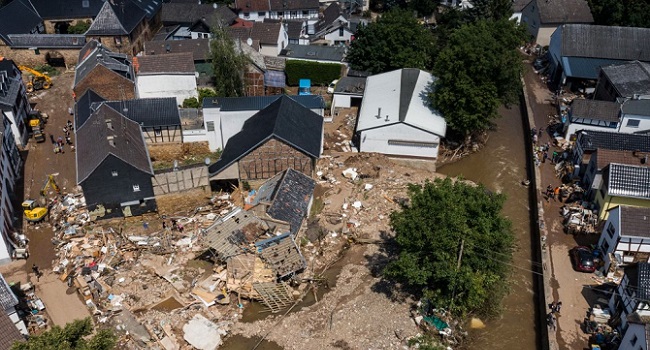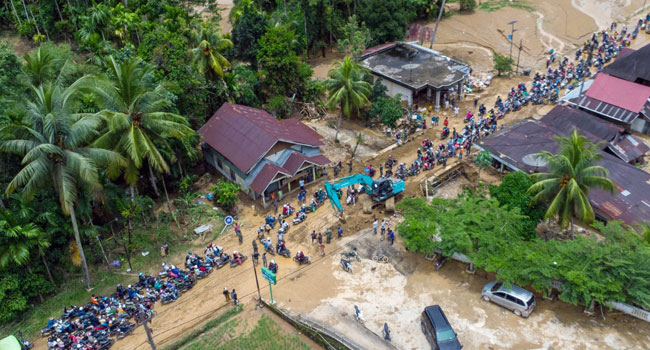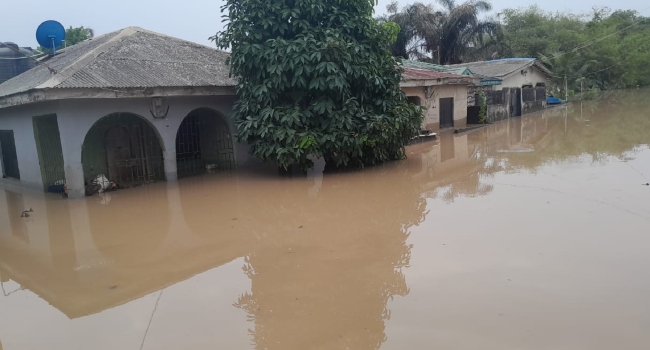
As Germany mourns more than 150 people who died in floods and begins a mammoth clean-up task, questions are mounting about whether the country’s weather warning system failed to keep citizens safe.
Although meteorological services had forecast torrential rain and flash floods for western Germany last week, many residents said they were caught off-guard by rapidly rising waters that destroyed roads, bridges and homes.
“We shouldn’t be mourning this many fatalities in 2021,” Hannah Cloke, a professor of hydrology at Reading University, told German broadcaster ZDF.
There had been “breaks in the warning chain” somewhere along the way, she said, and messages to evacuate or shelter in place on higher floors did not get through to enough people.
Under Germany’s federal system, it is up to the 16 regional states to organise responses to flood alerts and coordinate efforts with the civil protection office and the fire brigade.
Many local authorities use sirens, loudspeaker announcements or radio and TV bulletins to warn residents of acute danger or issue evacuation orders.
READ ALSO: Israel Removes Cancer Patients From Third Vaccine Jab List
There are also smartphone apps to keep users up to date on extreme weather in their area.
But Bild newspaper condemned the “failure” to take early action in the battered states of Rhineland-Palatinate and North-Rhine Westphalia.
“The sirens stayed quiet in plenty of places, very few alerts were issued,” it wrote, labelling the deadly flooding that followed “a disaster for civil protection, one of the state’s most essential jobs”.
– ‘Too late’ –
Gregor Degen, a baker in the town of Bad Neuenahr-Ahrweiler in Rhineland-Palatinate, where the swollen Ahr river did some of the biggest damage, was among those caught by surprise last Wednesday evening.
“We’d heard weather reports of heavy rainfall and seen the odd picture of a flooded street in the region, but no one could imagine anything like this,” he told AFP.
“I saw a short alert but by then it was too late,” he said, recalling water quickly rising to a level of 2.5 metres (eight feet) in his home. “There was nothing you could do.”
Malu Dreyer, the state premier of Rhineland-Palatinate, surveyed the devastation in the nearby town of Schuld on Sunday and insisted that communities had heeded the weather warnings and “had all activated their flood defence systems”, including sirens in certain areas.
But she acknowledged that downed power lines and mobile phone outages had complicated efforts to reach everyone.
Gerd Landsberg, head of the German Association of Towns and Municipalities, called for an overhaul of the early warning system.
“People had the impression that it was just heavy rain, the dramatic scale of it was not clearly communicated,” he told the Funke newspaper group.
He called for more staff and more competencies for the Federal Office for Civil Protection and Disaster Assistance (BKK), and said the siren system should be used more widely so people can receive messages even when the electricity is out.
Minister for Research Anja Karliczek said Germany must prepare better for natural disasters, expected to become more frequent because of climate change.
“One of the lessons of this catastrophe in western Germany is that we must improve our research into these extreme weather episodes in the next few years,” she said.
Chancellor Angela Merkel, who visited the flood zone in Rhineland-Palatinate on Sunday, said lessons should be learnt but cautioned against overly high expectations.
“Of course we ask ourselves what can be done better?” she said. “But in some situations things happen so quickly that you can’t fully escape the force of nature.”
AFP




